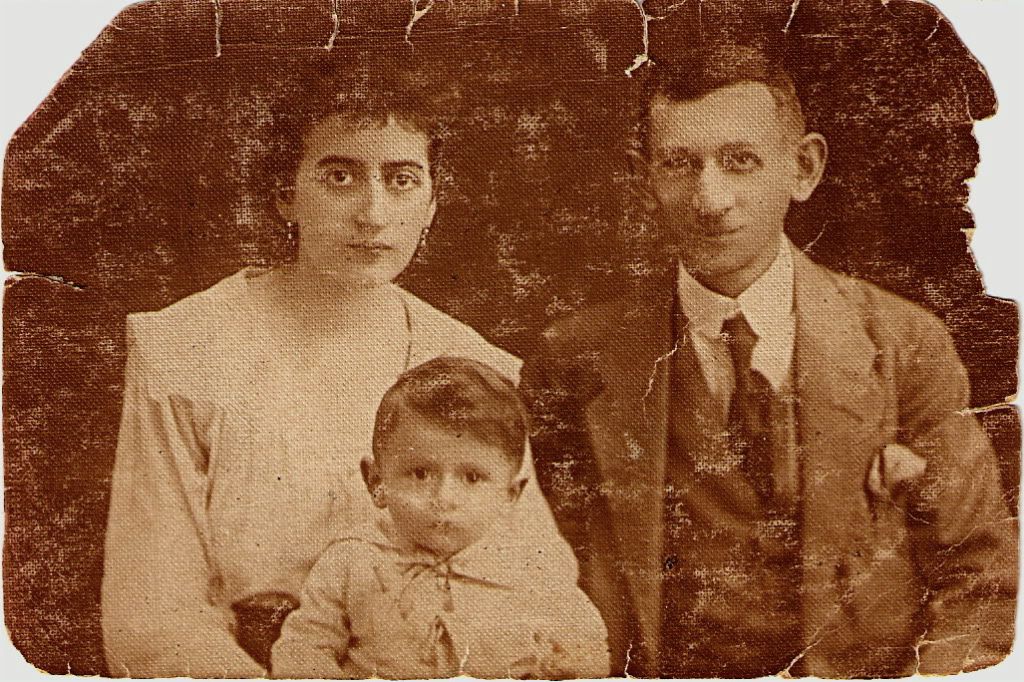
My father's mother, my father, his father, c.1919
Because his parents were poor and lived in a small flat, my father had to live with his paternal grandparents and his aunts in their own small flat. Here he is remembering, first his parents, and then his sickly maternal grandfather.
*
Most of the shops [in my childhood] were on the Körút, or ring road, which was only about three minutes walk from us. My father's workplace was far away and I never visited it. He never brought back colleagues from the factory, only his bitterness. He hated it beause he was very poorly paid and because he felt he could have done better for himself. One of the directors of the factory was his brother's brother-in-law who never treated my father as a relative and tended, rather, to push him down. Life was very difficult and I remember days when my father's hat preceded him into the flat and he came in swearing, throwing his wage packet angrily on the table. He was a rather gentle person otherwise and my mother tended to be the dominant figure...
My mother came from a slightly higher class - I think she was always conscious of it - but there wasn't that much difference. Her family were small tradesmen but she was probably a bit cleverer than my father.... To tell you the truth I don't know if my mother was ever in love with him.
She had dark hair, big eyes, a straight nose and a good slim figure. She was a very pretty woman. What I remember most are her eyes, very big, very searching.. Two of her sisters [she came from a family of ten] were already married by the time she met my father, but they didn't lead a close family life, not like my father's parents. They were colder people and the sisters didn't get on particularly well with each other. They were more strictly Jewish than my father's people.
It was difficult on my mother's side. Her mother had to look after a sick husband. He - my maternal grandfather - gave me the impression of being a wise old man, always in the bedroom under big white covers, his white beard and snow-white moustache showing over the sheets. He loved for me to sit beside the bed and would tell me stories. There was one that went:
Do you know how Christ became Lord? Once a year God listens to people. Whatever they wish for in the moment God is listening to them - though they don't know God is listening - comes true. Well, Jesus knew of this and for a whole year he kept repeating: I want to be King. I want to be King, so that God would hear him when his moment came, and indeed he succeeded and that is how became Lord.
Of course, I believed it and always thought how clever Jesus was. I asked him who told Jesus about this? He told me that Jesus read it in a book.
There was the other story he told me about Moses and the Ten Commandments, about how Moses was leading his people out of Egypt when the Red Sea opened up. He described it to me so vividly, all the time holding my hand - he was very sick but he never complained even though he had to have morphine, which made him very talkative - and I saw it so vividly the whole scene seemed real and clear to me. There I was sitting by his bedside and I saw the sea open.
He tried, in his own gentle way, to lead me into religion, chiefly through stories like this that told of miracles and marvels.
*
Do I edit? Of course I edit. It's the least I can do for him. The language is simple and though these conversations were recorded in fairly artless fashion shortly after the death of my mother, he normally wanted to tell a good story; to discover an ever-better, ever-improving anecdote. If he could have turned his entire life into one anecdote, ideally with a punch line, he might have been tempted to do so. Anecdotes are, after all, clearly defined shapes, and shape is meaning.
Here, I am just beginning to try to give him what he wanted. I must learn to render his voice with the proper colour in a language that was not his own. I expect clumsiness and blandness at first - then I hope to improve.

1 comment:
It is always good to begin, and this is a good beginning.
Post a Comment